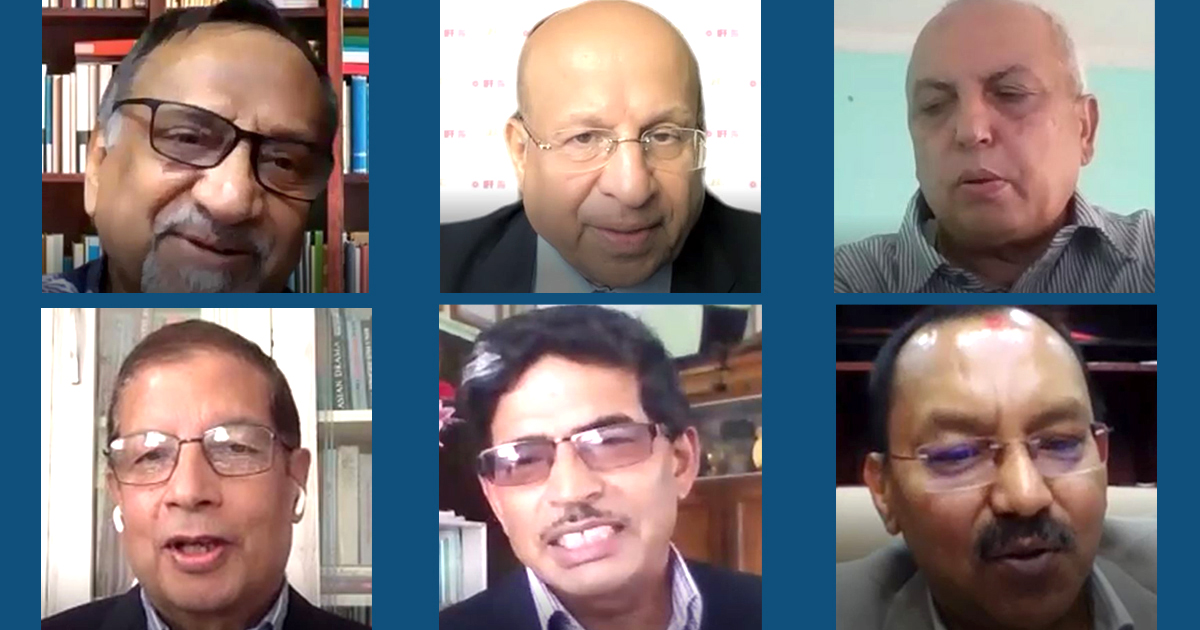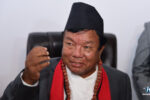KATHMANDU: The government unveiled the annual budget for the fiscal year 2021/22 on May 29.
As soon as the budget was made public through the ordinance, those concerned in the economic sector have made their views public.
Experts believe that the size of the budget brought by the ordinance during the coronavirus pandemic is relatively large and the implementation is challenging.
The Institute for Strategic and Socio-Economic Research (ISSR), organized a virtual discussion program on the budget with the economists, businessmen and entrepreneurs.
Here are the excerpts of the views of the experts:
Prof. Dr. Bishwambhar Pyakuryal/Economist
Professor Dr. Bishwanbhar Pyakuryal said that the budget doesn’t look so bad; however, considering the constraints created by the political instability and the coronavirus pandemic, the implementation is very challenging.
He pointed out that as there are many cases against the government itself, the government’s days in power are also uncertain.
“The wide-spreading coronavirus pandemic and the political instability make the implementation an uphill task,” Professor Pyakuryal said, adding, “Similar programs and promises were there in former Finance Minister Dr. Yuba Raj Khatiwada’s time, everybody knows how far the programs got materialized.”
He wished the budget would fare better fate this time.
In Dr. Pyakuryal’s opinion, although the budget has an expected economic growth rate of 6.5 percent, there is no warranty for it for the budget lacks some substantive support to assure the growth.
It is not clear how the budget will address the needs of the poor and reduce poverty, he said.
He pointed out that although some reports reveal that poverty has increased by 34 percent of late, the budget has not addressed the issues related to the hardship of the daily wage earners and other poor people.
According to Pyakuryal the amount allocated for the vaccine against coronavirus is enough for the inoculation of all Nepalis however, here too, the challenge lies in procuring the vaccines on time.
He recalled that a survey conducted in 94 countries by UNICEF, WHO and Gavi Alliance showed that two doses of the vaccine against the coronavirus pandemic cost around $ 3.70 and added that even if it costs around eight dollars the allocated budget will be enough.
“There is nothing that is not included in this budget, he said, adding, “The budget has tried to cover everything as much as possible.”
Professor Pyakuryal appreciated the government’s plan to offer a 20 percent concession in food items.
“The decision to give a discount of up to 25 percent on the transportation of goods including vegetables and milk is likely to find a market for wasted goods in different parts of the country,” he added ahead.
According to Pyakuryal, there are now two types of instability in particular: political instability and economic instability.
The budget meant to help the country overcome the current impasse seems confused in itself due to the instability.
Dr. Shankar Sharma/Economist
Taking part in the interaction Dr. Shankar Sharma pointed out that the details of the expenses under Social Security used to be in Schedule 1 of the Budget; however, this time it was not there.
He expressed skepticism over the ability to utilize the budget as this budget is bigger than last year.
“Even if this budget is spent a lot, it is not possible to spend more than Rs 1300 billion,” Dr. Sharma said in the interaction.
He expressed concern over the increasing loan.
“Loans are on the rise. In this budget, Rs. 12 billion has been allocated for the Prime Minister’s Employment Program,” former vice-chairman of National Planning Commission Dr. Sharma said, adding, “The source for this is the loan from the World Bank.”
He remarked that even if the government calls it employment, there is no benefit in investing in such a program as there is no employment.
Since such expenses do not produce anything, the government only has to repay the loan.
Dr. Sharma said that although there are many relief and discount programs in the budget, the kind of relief that should have been given to the 3 million people working in the informal sector is not there.
He pointed out that the relief package for the daily wage earners seems missing.
The budget says talks about a 25 percent discount on transportation; however, it is not clear how to give it, to which category the program is targeted, Dr. Sharma said in the program.
He reminded that the budget had the target of a 7 percent growth rate last year; however, the growth rate turned -2.
Prof. Dr. Govinda Nepal/Economist
Another participant of the program, Professor Dr. Govinda Nepal remarked that the country is facing an economic crisis generated by a health crisis and political crisis.
According to Dr. Nepal, the budget seems to prioritize addressing the economic crisis and the health crisis.
He commented that the current budget seems to be based on national needs and crises rather than on the principles of economics.
“At present, the government has provided relief and facilities to various businesses including the private sector,” Professor Nepal said, appreciating the good aspect of the budget and added, “It seems to have been given for the purpose of reviving the business sector, which was affected by the coronavirus pandemic. This is also a good thing.”
He also pointed out that although the current budget should bring relief to low-income workers and daily wage earners, it has not been able to address that.
Dr. Nepal remarked that the government has to provide at least Rs 14,000 as a relief to each low-income family.
He said that the problem lies in the budget implementation as well.
However, the implementation of the budget is a must as it is related to the basic livelihood of the people.
Prof. Dr. Shiv Raj Adhikari/Economist
Professor Dr. Shiv Raj Adhikari remarked that the budget seems a bit more political.
He also commented that the budget seems to have ignored the informal sector.
“We talked about giving relief to the formal sector through the budget, but it seems that the informal sector has been left out,” Professor Adhikari said.
Hinting at the high growth rate target, he said that the goal of economic growth is set without any research; hence, it is often set around 6 percent per year.
Dr. Chandra Mani Adhikari/Economist
Stating that a budget is regarded a constitutional proof, political evidence, Dr. Chandra Mani Adhikari remarked that the connection of the budget to the people and the development is seen missing of late.
“It seems that we are slowly forgetting that the budget is connected with development and the people,” he said, adding, “Considering the past experience, from the perspective of the economic literature that studies about the budget, it sounds good, but the implementation part is often poor.”
He added that looking at the current budget from all angles, it seems trying to include and invite everyone; however, most of the people who have no access to government and facilities cannot benefit from any of the packages it talks about.
“The subsidy given by the government to the farmers for seeds will be given to the farmers who have land but how can the farmers who do not have land get the relief from the government?” he asked, adding, “The budget shows a similar situation.”
He also pointed out that there is a large group that is making a livelihood by working daily and the government’s budget has not been able to address them.
Dr. Bindu Lohani/Economist
Dr. Bindu Lohani mentioned that during a crisis as we have now (pandemic crisis), addressing the crisis will often need three phases – respond, reset and rebound. This budget seems to be for “responding to the crisis” which is correct – hope this will help to move to the “Reset” phase.
During the implementation stage, it will be desirable to also start looking at the “rebound” phase.
Every crisis is also an opportunity and hence focussing on some selected priority areas for new growth would be desirable. Two such areas could be Green Growth and Digital economy and there are others. They could add new jobs, new skills, and new GDP.
For example, the budget talks about buying 100 new electric vehicles, 500 charging stations, and a few other green agenda. This is positive.
It would be desirable to look into a comprehensive “green recovery“ package with a long-term vision of carbon neutrality, a global, priority, with international funding, preferably with most, if not all, grant funding. This is still possible during the implementation phase of the budget.
Dr. Lohani remarked that the Government should do more in digital technology and engage the private sector and give them the right environment to do a lot more keeping in mind the future needs. This youth will also benefit more from this.
The budget allocated for health, education, infrastructure, tourism, is understandable and needed. It will be desirable to benchmark the quality and results. “Quality on everything we do” – this needs greater attention.
For example, the budget talks about building hospitals and adding more beds that are needed. It would be desirable to specify the ultimate quality objective.
If we could say that our medical facilities will provide quality services so that citizens will not need to travel to other countries( e.g. India, Singapore, or Bangkok), it will take the country to the next level.
He advised that the government make a strong commitment to technology – adopting, adapting, and leapfrogging – “the current status is we are far behind”. For example, the Government has announced to reduce the tariff on drinking water up to 20,000 liters but it is important to also reduce huge leakages of water by adopting smart water technology.
Similarly, there is great potential for adopting smart energy technologies. Technology and Innovation should become a strong theme during the implementation of the budget.
Like all budgets, the real issues are effective implementation, execution, and enforcement.
These are known issues but do not get corrected. There are good practices and knowledge which could be used based on other countries if there is a wish to reform. Let us hope that it will be different.
Dr. Rabindra Pandey
Another speaker in the program, Dr. Rabindra Pandey, also said that the budget looks good, but the endorsement is likely to be a challenge for various reasons.
He commented that it seems more distribution-oriented.
“Since the government has said that the country will go to the polls after six months, it is worth wondering whether it is appropriate to bring such a large budget in the current situation,” Dr. Pandey said.
He lauded that the priority of the budget is the education and the health sector as this is necessary in the current situation.
“However, this budget seems to have been brought in the midst of difficult circumstances,” Dr. Pandey said ahead, “It doesn’t look like a budget targeted at the crisis.”
He appreciated the positive aspects of the budget such as providing soft loans to the private sector.
Naresh Shrestha, Entrepreneur
Taking part in the discussion, Naresh Shrestha appreciated the budget.
“While the budget of previous years has been harassing the private sector by raising taxes, this year’s budget has tried to give some relief to the business community by providing tax exemption,” he said.
According to him, the private sector is happy and optimistic about the budget as it has given some concessions though small ones.
“This budget is welcome for the private sector,” Shrestha added.









Comment